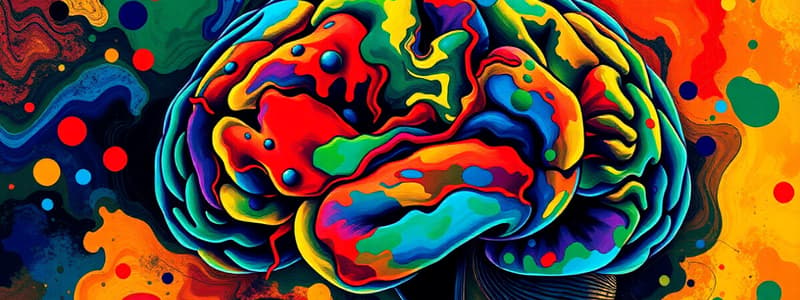Podcast
Questions and Answers
What does biological psychology primarily aim to discover?
What does biological psychology primarily aim to discover?
- The development of psychological disorders
- How biological fundamentals produce psychological phenomena (correct)
- The classification of animal species
- The history of psychological theories
Which technique is NOT used in biological psychology?
Which technique is NOT used in biological psychology?
- Neuroimaging techniques
- Post mortem dissection
- Behavioral therapy (correct)
- CAT scan
What is phrenology associated with?
What is phrenology associated with?
- The study of personality through skull bumps (correct)
- The measurement of brain waves
- Neuroimaging and brain activity
- Neuroscience research in brain injuries
What does EEG measure in biological psychology?
What does EEG measure in biological psychology?
Which condition is characterized by the inability to respond but awareness of self and environment?
Which condition is characterized by the inability to respond but awareness of self and environment?
What does FMRI help detect in patients with a vegetative state?
What does FMRI help detect in patients with a vegetative state?
Which of the following offers a way for locked-in syndrome patients to communicate?
Which of the following offers a way for locked-in syndrome patients to communicate?
What is a misconception about behavioral assessments in vegetative patients?
What is a misconception about behavioral assessments in vegetative patients?
Flashcards
Biological Psychology
Biological Psychology
A field of study that explores the biological bases of psychological phenomena, like learning, memory, and emotion.
Phrenology
Phrenology
An outdated idea that personality traits are linked to bumps on the skull.
Neuroimaging Techniques
Neuroimaging Techniques
Methods used to visualize and measure brain structure and function.
CT Scan
CT Scan
Signup and view all the flashcards
Vegetative State
Vegetative State
Signup and view all the flashcards
Locked-in Syndrome
Locked-in Syndrome
Signup and view all the flashcards
EEG
EEG
Signup and view all the flashcards
FMRI
FMRI
Signup and view all the flashcards
Study Notes
Biological Psychology
- Aims to understand how biological processes create psychological phenomena (learning, memory, emotions, perception)
History of Biological Psychology
- Phrenology (19th Century): Gall proposed personality and abilities are revealed by skull bumps.
Techniques
- Observational studies: Behaviour after head injuries
- Animal brain dissection
- Post-mortem human brain dissection
- Microscopic nerve cell examination
- Neuroimaging
Neuroimaging Techniques
Brain Structure
- CT scan (Computed Tomography): Computerized scan of brain structure
- MRI scan (Magnetic Resonance Imaging): Detailed images of brain structure using magnetic fields
Brain Function
- EEG (Electroencephalography): Measures electrical activity in brain
- PET scan (Positron Emission Tomography): Shows brain activity by detecting radioactive substances
- fMRI (Functional Magnetic Resonance Imaging): Measures changes in blood flow in the brain related to activity
- MEG (Magnetoencephalography): Measures magnetic fields generated by brain activity
- TMS (Transcranial Magnetic Stimulation): Uses magnetic pulses to stimulate or disable brain areas
Disorders of Consciousness
- Coma: No wakefulness or awareness; no response to commands
- Vegetative State: Awake but unaware; sleep-wake cycles and reflexes present, no response to commands
- Locked-In Syndrome: Aware and awake but unable to respond due to paralysis and speech impairment; communication via eye movements
EEG and Vegetative Patients
- EEG can investigate brain activity in vegetative patients
- Healthy brains show complex, connected networks.
- Some vegetative patients show preserved networks similar to healthy adults.
Conclusions about the Vegetative State
- Behavioural assessments may underestimate awareness in patients with severe motor impairments.
- fMRI can detect residual cognitive function and awareness, even in locked-in syndrome cases.
- fMRI and other brain activity measures allow individuals in vegetative states potential communication.
Studying That Suits You
Use AI to generate personalized quizzes and flashcards to suit your learning preferences.




